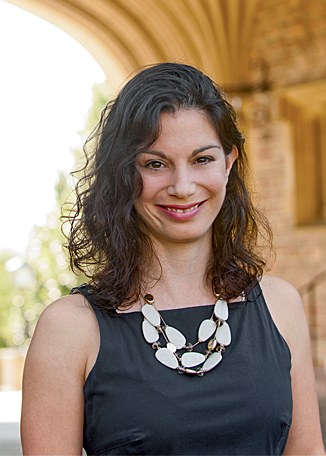
WASHINGTON MAGAZINE: What exactly will you be doing in your new role as dean?
JENNIFER R. SMITH: My goal is to ensure a transformative experience for every undergraduate student who receives a degree from or takes classes in Arts & Sciences. My responsibilities involve overseeing undergraduate academic activities in Arts & Sciences, such as curriculum and advising. I will work with the deans in the College Office to assist our students during their time at Washington University through individual advising and through programming, and I will work with faculty to support development of innovative pedagogical strategies. I will also be working closely with Sharon Stahl, the vice chancellor for students, to see that our undergraduate experience fosters an intellectual engagement both in and out of the classroom, and aids our students in reaching their full potential as scholars and as members of a global community.
“My research has always been interdisciplinary — at the interface of geology, archaeology and environmental studies — so I have become very aware of the challenges involved in cross-disciplinary study and education.”
—Jennifer R. Smith, PhD
WM: How has your tenure as a professor in earth & planetary sciences prepared you for leading in this new role?
JS: For the past nine years I was director of undergraduate studies in the Department of Earth & Planetary Sciences. I was fortunate enough not only to form relationships with outstanding students, but also to begin thinking about how students’ experiences in their major field of study integrates with their general education, and with their co-curricular activities and daily life outside the classroom. My research has always been interdisciplinary — at the interface of geology, archaeology and environmental studies — so I have become very aware of the challenges involved in cross-disciplinary study and education, but also of the unique benefits that come from working with people who bring very different perspectives and ideas to questions of common interest. My field research, across North Africa and the Middle East, has also given me an appreciation for working and learning across cultural divides.
WM: How has working with students in the classroom, as an adviser or in the field helped prepare you?
JS: The different settings in which I have interacted with students have each contributed to my building an understanding of the busy and complicated lives most of our undergraduates are leading. In the classroom, I have been consistently impressed by students’ insight and drive, and am therefore strongly committed to ensuring we are using the best of current research on education, learning and pedagogy, as well as available technology, to provide a learning experience that truly challenges our students. As an adviser, I’ve come to appreciate the diversity of interests and paths among our students, while recognizing that they do share a deep desire to give back, to be a contributing member of a community. That passion on the part of the students really obligates us to help them develop their skills and abilities toward maximizing both the contribution they can make to society and their own personal fulfillment.
WM: What do you hope to accomplish in your first year?
JS: Critical to any educational experience are the relationships and communities that allow and support true intellectual growth; therefore, in my first year I plan to focus principally on building within and between students, faculty and staff. We have an incredibly dedicated staff and faculty; just by enhancing interaction and collaboration between them I believe it will be possible to devise innovative ways to serve our students. These communities will also be integral in identifying any issues of general concern within our undergraduate experience, which we can then work to improve. I am particularly interested in assessing the possibilities for increasing the number of interdisciplinary course offerings in Arts & Sciences — courses in which two or three faculty members participate together, demonstrating the value of discourse (and sometimes disagreement) between experts who bring differing perspectives to the same topic.
WM: How do you hope to impact student education, both in the near- and in the long-term?
JS: My hope is that we will be able to enhance our already excellent disciplinary training and broad general education requirements by using our classroom experiences more deliberately to build those skills (e.g. critical thinking, synthesis, innovation, understanding different perspectives) that represent the “value-added” component of a liberal arts education. This will be a long-term effort that would involve partnership with faculty in exploration and trial of new classroom techniques and course structures, and ideally also the development of a method to evaluate the growth of our students in these areas. In the near-term, I plan to work closely with the office of the vice chancellor for students to take advantage of the opportunities provided by our new general education curriculum to more specifically integrate academic studies with programming and events that are a part of campus life, toward a more holistic sense of intellectual engagement throughout the student experience.
At publishing time, the magazine learned that Dean Smith was selected a 2013 Eisenhower Fellow, one of eight in the United States to be named.
Retired Gen. Colin L. Powell, chairman of Eisenhower Fellowships, announced the eight winners. He stated, “This is a unique opportunity for a group of outstanding leaders to broaden themselves personally and professionally.”
As part of her fellowship, Smith will spend a month in India next summer on an intensive individualized professional program. For more, visit the Washington University Newsroom.
Comments and respectful dialogue are encouraged, but content will be moderated. Please, no personal attacks, obscenity or profanity, selling of commercial products, or endorsements of political candidates or positions. We reserve the right to remove any inappropriate comments. We also cannot address individual medical concerns or provide medical advice in this forum.